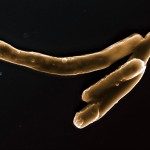Lien vers Pubmed [PMID] – 16698431
Hum. Immunol. 2006 Jan-Feb;67(1-2):102-7
The C-type lectin DC-SIGN is involved in early interactions between human innate immune cells and a variety of pathogens. Here we sought to evaluate whether DC-SIGN interacts with the leprosy bacillus, Mycobacterium leprae, and whether DC-SIGN genetic variation influences the susceptibility and/or pathogenesis of the disease. A case-control study conducted in a cohort of 272 individuals revealed no association between DC-SIGN variation and leprosy. However, our results clearly show that DC-SIGN recognizes M. leprae, indicating that mycobacteria recognition by this lectin is not as narrowly restricted to the Mycobacterium tuberculosis complex as previously thought. Altogether, our results provide further elucidation of M. leprae interactions with the host innate immune cells and emphasize the importance of DC-SIGN in the early interactions between the human host and the infectious agents.



